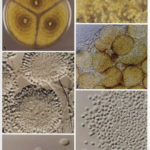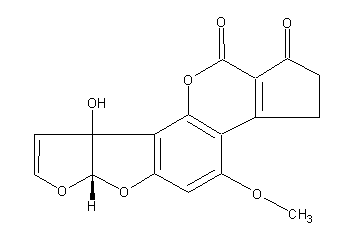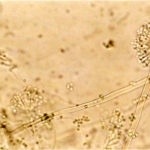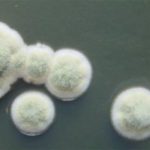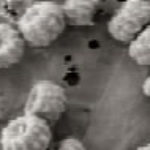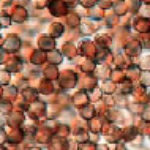Date: 26 November 2013
Secondary metabolites, structure diagram: Trivial name – aflatoxin M1
Copyright: n/a
Notes:
Species: A. flavus, A. parasiticusSystematic name: Cyclopenta[c]furo[3′,2′:4,5]furo[2,3-h][1]benzopyran-1,11-dione, 2,3,6a,9a-tetrahydro-9a-hydroxy-4-methoxy-, (6aR-cis)-Molecular formulae: C17H12O7Molecular weight: 328.28Chemical abstracts number: 6795-23-9Selected references: Nakazato, Mitsuo; Morozumi, Satoshi; Saito, Kazuo; Fujinuma, Kenji; Nishima, Taichiro; Kasai, Nobuhiko (Dep. Food Hyg. and Nutr., Tokyo Metrop. Res. Lab. Public Health, Tokyo 169, Japan). Eisei Kagaku, 37(2), 107-16 (English) 1991.Toxicity: Slightly less toxic than aflatoxin B1 with an oral LD50 for the one day-old duckling 0.46 mg/kg body-weight. Significantly less carcinogenic than aflatoxin B1.
Images library
-
Title
Legend
-
Pigmentation of Aspergillus versicolor colonies ranged from pale green to greenish-beige, pink-green, dark green and brown. Reverse is usually reddish. The growth rate is usually slow. Cultured on Sabouraud dextrose agar with chloramphenicol.
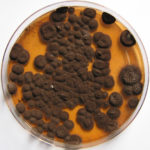
-
A Colonies on MEA after one week; B, C conidial heads with tip of conidiophire, x920; D conidial head, x 2330; E conidial heads x920
![aspvers[2] aspvers2](https://www.aspergillus.org.uk/wp-content/uploads/2017/10/aspvers2-150x150.jpg)
-
A Colonies on MEA + 20% sucrose after one week; B detail of colony showing columnar conidial heads x 44 ; C conidial heads x 920; D conidia x2330
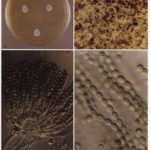
-
Cultures are grown on malt extract agar for 5-7 days at 30°C.
Light microscopy-1000x stained with lacto-phenol and cotton blue.
-
A Colonies on MEA +20% sucrose after one week; B ascomata x 40; C conidiophores x 920; D ascospores x2330; E ascoma x 230; F portion of ascoma with asci and ascospores, x 920.
